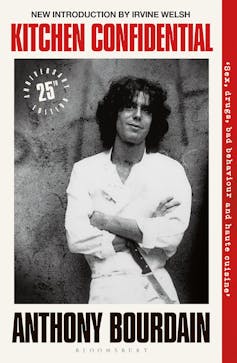Kitchen Confidential at 25: Anthony Bourdain revealed high-end chefs as rock-star pirates with a passion for food
- Written by The Conversation

Kitchen Confidential: Adventures in the Culinary Underbelly was released 25 years ago into a culinary world vastly different to today’s. With his signature semi-gonzo style, all sarcasm, wit and profanity, Anthony Bourdain lifted the pot lid on the world of the professional restaurant kitchen.
That world, if we were to believe Bourdain, was full of ne’er-do-well line cooks, shady produce purveyors, drug-fuelled hi-jinks and ego. Lots of ego. It was also full of people who loved food, who recognised, as Bourdain put it, that “food had power”. Smash-hit show The Bear is set in a kitchen universe resembling this very world.
Bourdain’s book is part memoir, part journalistic tell-all. Trainspotting author Irvine Welsh has written the introduction to the anniversary edition. Food writer A.A. Gill once called the book “Elizabeth David written by Quentin Tarantino”. In its pages, Bourdain unfolds the story of a contrary young man who enters the culinary world because food made him feel something.
Kitchen Confidential was Bourdain’s first non-fiction book (he had previously published two crime novels) and it springboarded off a piece he had written for the New Yorker.
A kitchen fever dream
By the time he published Kitchen Confidential, Bourdain was contentedly installed as executive chef of the Manhattan branch of Brasserie Les Halles, the culmination of years of experience in the professional kitchen.
The catalyst for his love of food, we’re told, was an oyster, shucked fresh from the bed by a French oyster-fisher, sampled in defiance, his horrified family looking on. In his usual economically descriptive style, Bourdain tells us that “it tasted of seawater … of brine and flesh … and somehow … of the future”.
He recounts his journey from pretentious teenager, smoking pilfered cigarettes and failing out of Vassar College, to arrogant kitchen hand thrust into learning classic techniques at the Culinary Institute of America, and finally to his substance-addled climb up the professional ladder.
In between this personal narrative, Bourdain offers his readers insights and opinions: why you shouldn’t order fish on a Monday, the set up of a diligent line cook’s mise-en-place (the cook’s prepared ingredients and essential tools), the best knife to buy if you wanted to try this at home.
Bourdain wasn’t the first culinary “bad boy” to write their memoir. Marco Pierre White’s White Heat, published a decade prior, portrayed White as a chain-smoking culinary savant. However, Bourdain’s book went further and deeper, and his innate storytelling skill made Kitchen Confidential stand out. Reading it, it’s easy to imagine the bone-deep exhaustion, feel the exhilarating rush of service, hear the patois of the kitchen.
Kitchen Confidential made the work of a professional kitchen seem like a fever dream. To Bourdain, chefs were anti-authoritarians. Rockstars. Pirates. Being a chef was cool. Of course, that patina of cool hid systemic problems: drug addictions, misogyny, racism, stress and exploitation.
Dark restaurant underbelly
Kitchen Confidential was certainly a response to the emergent trend of food as entertainment at the time. The Food Network started programming in 1993 and turned chefs, previously known only in the depths of the culinary world, into superstars on television sets across the world.
Of course, there had been cooking shows around for a long time: Julia Child’s The French Chef was first broadcast in 1963. But those programs were for housewives, lacking the commercial glamour with which the Food Network gilded their stable of chefs, including American chefs and restaurateurs Emeril Lagasse and Bobby Flay. Bourdain was hypercritical of this “credulous” approach to food, an attitude which suffuses Kitchen Confidential.
Rather than embracing what he saw as the sterility of those television chefs, he revelled in the “dark recesses of the restaurant underbelly”. He wanted us to, as well. Bourdain set out to shock the establishment. He succeeded.
Kitchen Confidential is also a reflection of the state of masculinity at the turn of the 21st century. When Bourdain describes the restaurant kitchen, it is hyper-masculine. He points out those rare women who could “cut it” in the machismo-heavy atmosphere.
He claimed he had worked “with some really studly women line cooks”. What made them so good? They “refused to behave any differently than her male co-workers”. In order to succeed, women had to behave like men.
While Bourdain may have tempered these views in his later career, men are still the dominant gender in the professional kitchen. It is not friendly to women, as non-binary Australian chef Jess Ho pointed out in their recent kitchen memoir, which has been compared to Bourdain’s.
You can imagine a slew of young men would have been encouraged to try their hands at the culinary arts after reading Bourdain’s macho, swashbuckling stories of life on the line.
Passion, isolation, abuse
Kitchen Confidential also shed light on the overwhelming amount of mental health issues at play in the professional kitchen. He detailed his own ongoing struggles, as well as those of colleagues.







